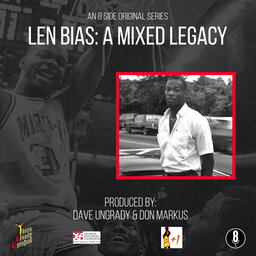Len Bias: A Mixed Legacy | The Interviews: Dorothy Gaines
The podcast series continues with new episodes by releasing the full length interviews from the series. The first interview episode is with Dorothy Gaines. Dorothy is an example of the cruel and harsh mandatory minimum sentencing laws introduced following the death of Len Bias. She recounts her story with executive produce Dave Ungrady.
Dorothy featured prominently in Episode 8 where the series profiled her and others whose lives were turned upside down by mandatory sentencing.
In 1 playlist(s)
Len Bias: A Mixed Legacy
Len Bias: A Mixed Legacy is a multi-part series about the legacy of former Maryland basketball star …Social links
Follow podcast
Recent clips

Len Bias: A Mixed Legacy | Bias's Last Few Months (Pt 1)
08:18

Len Bias: A Mixed Legacy | Remembering Lefty Driesell
33:17

Len Bias: A Mixed Legacy | The Interviews: Chris Washburn
42:09
 Len Bias: A Mixed Legacy
Len Bias: A Mixed Legacy